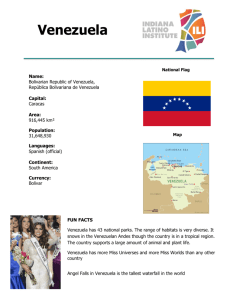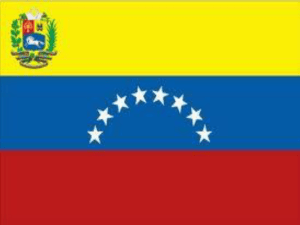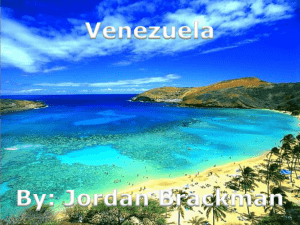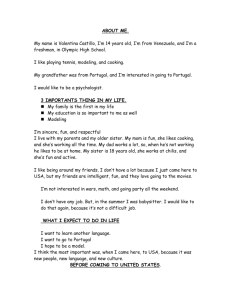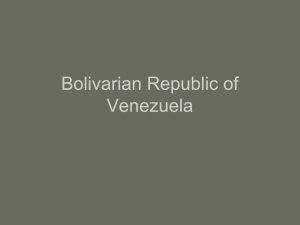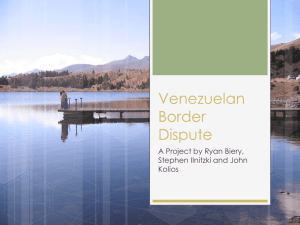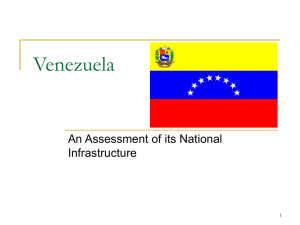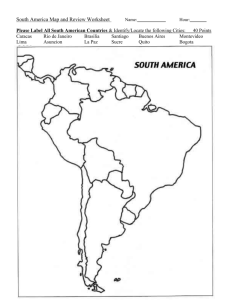File
advertisement
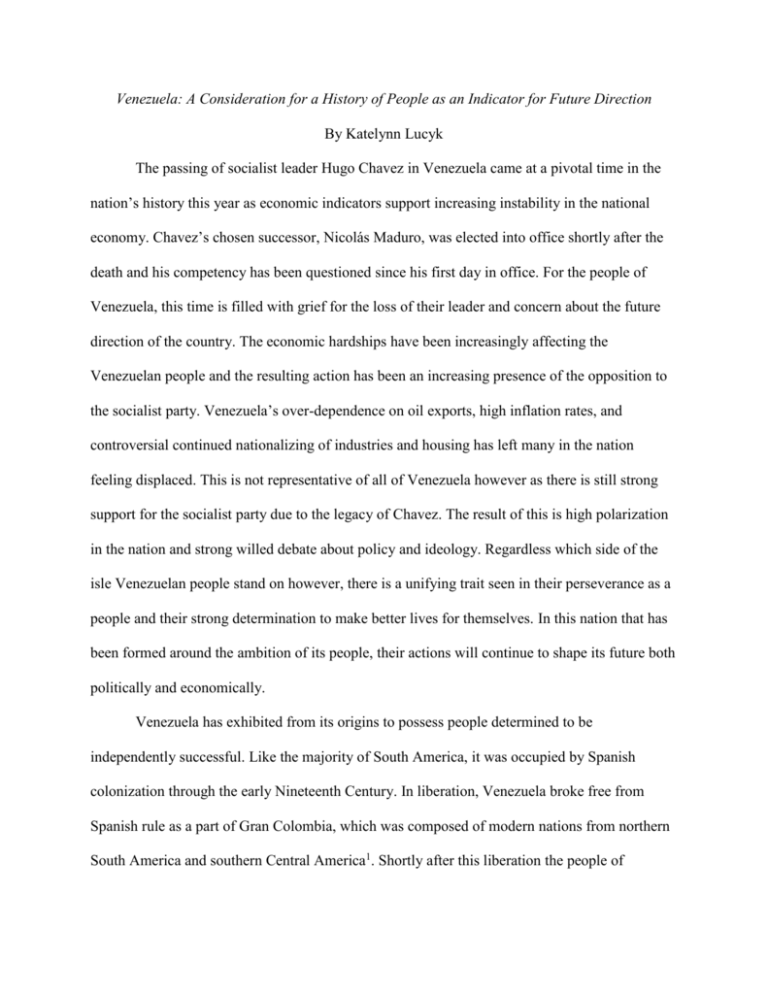
Venezuela: A Consideration for a History of People as an Indicator for Future Direction By Katelynn Lucyk The passing of socialist leader Hugo Chavez in Venezuela came at a pivotal time in the nation’s history this year as economic indicators support increasing instability in the national economy. Chavez’s chosen successor, Nicolás Maduro, was elected into office shortly after the death and his competency has been questioned since his first day in office. For the people of Venezuela, this time is filled with grief for the loss of their leader and concern about the future direction of the country. The economic hardships have been increasingly affecting the Venezuelan people and the resulting action has been an increasing presence of the opposition to the socialist party. Venezuela’s over-dependence on oil exports, high inflation rates, and controversial continued nationalizing of industries and housing has left many in the nation feeling displaced. This is not representative of all of Venezuela however as there is still strong support for the socialist party due to the legacy of Chavez. The result of this is high polarization in the nation and strong willed debate about policy and ideology. Regardless which side of the isle Venezuelan people stand on however, there is a unifying trait seen in their perseverance as a people and their strong determination to make better lives for themselves. In this nation that has been formed around the ambition of its people, their actions will continue to shape its future both politically and economically. Venezuela has exhibited from its origins to possess people determined to be independently successful. Like the majority of South America, it was occupied by Spanish colonization through the early Nineteenth Century. In liberation, Venezuela broke free from Spanish rule as a part of Gran Colombia, which was composed of modern nations from northern South America and southern Central America1. Shortly after this liberation the people of Venezuela pushed to establish their own independence as a sovereign nation. Military commander Simon Bolivar led these efforts, and for this he is still considered a national hero in Venezuela with the socialist movement named after him. While this newfound independence was a major achievement for the nation, it was one carved from unfortunate brutality. An estimated 30% of the population was slaughtered in the movements leading up to independence, forging the way for an unstable new nation with a strong realization of military power1. With the fighting devastating the only lucrative industry in Venezuela through destroying cacao fields the nation turned to coffee to generate an export economy1. As with other South American nations, this monoculture would prove to be a misstep as coffee is a resource-depleting plant that holds little stability in market price. The new government in Venezuela would also emerge with volatility, as military dictators would largely run the country for its first century in existence1. In reflecting upon the early years in Venezuelan history, the people were passionate nationalists who fought for their independence, however it was taken advantage of by the elite and the forceful. The lack of power held by the people in the economy and government would prove to not bode well with the Venezuelans. Repressed by their nation, multiple attempts to install a civilianrun government would be attempted during this century of military dictatorship1. The most successful pushes, however, came after the pivotal discovery of oil in Venezuela. For a nation that had struggled in the agriculture export market, this highly desired resource brought a new sense of promise for the future. While corruption of the industry benefiting the elite was prevalent at the commencement of the oil trade it would not be long before the citizens would begin to fight for social mobility advancements. Coinciding with this finding was the death of long time dictator, Juan Vicente Gomez1. Known as the “Tyrant of the Andes,” Gomez ruled harshly as he did little for the people and invested heavily in military operations and his personal interests. During his time in power after the discovery of petroleum stores, Gomez quickly began to exploit the resource while benefiting himself and his military while giving back little to the people of his nation1. This would lead to multiple attempts to overthrow the dictator, however he was able to maintain his power until his death in 1935. After Gomez’s passing, Venezuela experienced periods of political instability as it was ruled by periods of both authoritarianism and democracy1. This would all change in 1958 when the country made a lasting move towards democracy of civilian power1. In this, Venezuelans pushed to be represented by their peers as opposed to the repressive military leaders that ruled the first century of the nation’s existence. The hope was that this would bring forth the ability to introduce public assistance programs and promote an economy that presents opportunity to the people of Venezuela1. The discovery of the vast petroleum stores within Venezuela was particularly exciting at this time as it suggested greater economic stability for the long struggling nation. However, the people of Venezuela had not considered in this the parallels that existed between the petroleum market and that of their export agriculture. As stated previously, heavy investment in coffee in the nation’s earlier years led to a monoculture that depleted resources and fell victim several times to market price fluctuations1. Despite being in a different industry, oil is limited to the same constraints that bound agriculture. This is something Venezuela would discover, as the price of oil would experience highs and lows over the years following the shift to democracy. When Venezuelan oil was at its desirable peak during oil embargos of Middle Eastern competition within the industry, the government did what it was created to do by reinvesting in the people1. This was accomplished by nationalizing the oil industry and creating financial assistance programs to support the Venezuelan people and economy1. When the prices met their lows in the 1980’s however the static spending by the government accumulated massive amounts of debt which would result in the outrage of the citizens against their leaders1. Failure to examine their own past critically resulted in betting too high within one export and, just as before, this resulted in an interest in changing power. Petroleum monoculture made it difficult in times of market lows for the government to continue static funding of financial assistance programs and other nationalized services. When they could no longer provide consistency in these services, prices began to rise and this is when the effect of monoculture truly became a problem to the everyday lives of the Venezuelan people. As recalled in the documentary “Inside the Revolution: A Journey into the Heart of Venezuela” directed by Pablo Navarrete2, the day this became too much was in early 1989 as the result of an elderly women refusing to pay the increased bus fare. When the driver shoved the woman off the bus, the patrons got off of the bus and burned it in a protest to the fare increase. This sentiment ignited the nation as it reached the capitol city of Caracas and the ensuing revolution, while not as lethal, is comparable to that of their wild outburst of fighting for independence from Spain. Following this initial rioting phase there was an increasing demand in Venezuela for a new ideology within the government2. Emerging to this satisfaction of the people was a military officer, Hugo Chavez2. For the following decade, Chavez would lead a movement that would empower the people of Venezuela with the promise for better lives through modern socialism2. Despite the Cold War having just ended with the demise of socialism in many nations, the Venezuelans were enthusiastic about its ability to be different and more successful in their nation. The revolution would prove successful in 1998 as Hugo Chavez would be elected as President of Venezuela2. Within his first year of office Chavez proposed a new constitution that would be overwhelmingly approved by a public vote2. With his strong support of the people based on the promise of change through increased social responsibility and economic prosperity, Chavez had to decide how to achieve these promises through selectivity in economic ideology2. To become a socialist nation, it was important to stray from the notions of militias such as FARC who had long retained their status in South America as dangerous proponents of the left2. Attempting to truly present a modern socialist system, Chavez created the “enabling laws” that abolished large properties and made revisions to the reinvestment of oil profits2. The concept behind these actions were to give the land back to the people and use more of the revenues from the nation’s most profitable resource to fund public programs. The popular opinion in Venezuela was that the elite capitalists owned most of the property and that they were getting richer from the land and resources that should belong to the citizens as a whole2. Despite strong support for these actions, a strong opposition also persisted during these early times with powerful allies in the media and the United States government2. The work of this opposition would result in a coup attempt that would remove Chavez from power for only three days2. This opposition would continue to exist throughout the president’s term up until his death in 2013, however this would be the closest they would come to removing him from office. During this period in which Chavez served as President, the idea behind the enabling laws would expand exponentially within Venezuela. As depicted in the BBC World News3 special report, “Oil, Politics & Hugo Chavez,” these programs are difficult to assess for achievement due to the mix of responses of Venezuelans to the policies. Such programs established include government purchase of privately owned properties and housing developments and the use of oil profits to allow for subsidies for the purchase of goods such as food and clothing3. For many, these initiatives were welcomed whole-heartedly as they allowed average citizens to purchase goods for much less than the capitalist market would allow. In contrast, however, many Venezuelans find themselves losing jobs or their housing due to continuous and expansive nationalization of property and corporations. In an interview with one man who has experienced this, he reports his belief that the Chavez administration claims to be creating equality for citizens while what they are actually accomplishing is making everyone more equally poor3. He adds to this sentiment his belief that the mass nationalization has hindered investment interest in Venezuela, which he believes would better generate opportunity for prosperity. These beliefs are the key ideals of those who opposed Chavez as they maintained a firm belief in the promotion of capitalism within a democracy. Within the BBC special report, it is inconclusive as to whether the programs created by Chavez are ultimately beneficial to the people or not3. While oil-funded subsides have been largely enjoyed by the people, it is questionable if they are supporting the correct industries and if the nation can sustain the programs. This juxtaposition between support and opposition of the socialist order in Venezuela has recently reached a critical moment since the passing of Chavez in March of 2013. Prior to his death, the leader had been reelected in October of 2012 with 55.1% of the vote4. When his chosen successor, Nicholas Maduro, ran just six months after this he won with only 50.6% of the electorate5. This stark difference in results exhibits the loss of support for the political ideology currently holding the majority in the government. No different from all other periods of Venezuelan history, this loss of confidence stems from economic hardship being felt by the population. While there is not one singular cause for recent economic harm, the causes existing are widely attributed to the government of the Bolivarian movement. Prior to the death of Chavez, the oil industry had faced periods of instability through 2012 as the world was going through the global financial crisis3. To avoid loss of support in the same manner of the 1989 revolution, the government continued static funding of federally funded programs while also continuing to acquire more property and industry3. In the BBC report3 of the issue, one government official boasts that during this period of economic instability in the world, Venezuelan people did not “lose a single Bolivar.” While this appears to be an impressive feat, it was not a sustainable method for federal spending. Additionally, the acquisition of corporations by the government has been highly criticized for decrease in productivity following nationalization6. In the electricity industry, for instance, power outages have been more frequent and far-reaching since the government purchase of power plants in 20076. The result of this poor management by the government in both cases has most recently resulted in massive shortages of food and other goods7&8. This has coincided with spikes in inflation and increasing devaluation of the Bolivar as the nation continues to acquire more debt6. For new president Maduro, entering office at this time has been difficult, however he has only made matters worse according to some6. Maduro’s competency has been highly speculated since the election and his public missteps have caused the public to question their faith in him as a leader8. In his most recent attempt to correct this, Maduro’s plan to open a Ministry of Supreme Social Happiness has been announced as a reaction to the increasing voice of concern from the nation’s impoverished9. With municipal elections coming soon in Venezuela, it is concerning to the socialists and Maduro if actions such as this will be enough to garner support. While political instability and public opinion once again provide conflict for balance in Venezuela, the people who inhabit the country must continue living their lives each day. In discussion of political and economic events, the concept of humanity is often lost in generalizations of cause and effect on nations. However, what the people of Venezuela face today is far more intimate than an assessment of economic indicators provides information about. In a TED Talk entitled “Ingenious homes in unexpected places,” photographer Iwan Baan describes the way in which residents of Caracas have created homes from an abandoned tower at the city’s center10. This 45-story symbol of deserted investment paints a portrait of the current experiences of Venezuelan people who continue to show innovation in the absence of opportunity. Through his photographs, Baan shows the bustling community that has formed within the building with local businesses such as shops and taxi services and surprisingly elaborate homes built from assorted materials10. At the heart of the nation’s capitol, a small capitalist society has formed in this tower as social responsibility maintains its importance through organized neighborly assistance. This illustration of the people of Venezuela is supported in a report from West Chester University professors Monica Zimmerman and Hung Mahn Chu11 entitled “Motivation, Success, and Problems of Entrepreneurs in Venezuela.” In their explanation for focusing on Venezuela, the researchers explain that there is a high respect for entrepreneurs in the country and that it has actually been ranked second in the world for amount of new business ventures11. This provides evidence that, despite the lack of big-capital investment persisting in the country, Venezuelans still wish to run their own businesses and do so at high rates. They have not lost faith in their ability to create a better life for themselves by working hard and being innovative. These examinations of the interests of Venezuelan people outside political ideology are relevant to the face of the nation as it stands today. As Venezuelans wonder if the Bolivarian movement will continue to hold power or if there will be a shift in the majority party, more of a focus should be had on the actual policies being created than the overarching ideology. Venezuela has shown throughout its history to be a nation that changes based on the common interests of the people. However, far too many times this passion for change has led to the political shift in the government that tends to stray away from the issues that caused the change in the first place. The concept behind the nationalization of petroleum corporations is consistent with the ideals Venezuelans have shown throughout time. This country has proven to want to avoid the elite benefiting from depletion of all the nation’s resources while the rest of the nation sinks farther into poverty. However, the people of Venezuela have also shown themselves to be competent entrepreneurs and workers even in times of oppression and little opportunity. This should be considered more in the reinvestment of oil revenues as the current method of providing subsidies on food, goods, and housing belittles the capabilities of the Venezuelan people. By reinvesting these profits in the business ventures of the people instead of supporting their ability to live in the absence of ample opportunity, the nation will not grow to expand its export strengths beyond the limitation of oil. For this change to occur, the country does not need to rally behind a dramatic shift in political representation but instead push for policy change that places more accountability on themselves for economic action. When Chavez designed his vision for Venezuela, his intention was to do so using a third method of economic strategy that differed from the capitalist right and communist left that he viewed as unsuccessful. This is still accomplishable for the Venezuelan people, if only they will reconsider how they approach their interests before they once again replicate history and further drive the cycle of loss of opportunity. Works Cited 1. Richard A. Haggerty, ed. Venezuela: A Country Study. Washington: GPO for the Library of Congress, 1990. 2. Navarrete, Pablo. Inside the Revolution: A Journey into the Heart of Venezuela. Alborada Films, 2009. 3. BBC Our World. Oil, Politics, & Hugo Chavez. 2011. https://www.youtube.com/watch?v=_DxwzMmcYa4&list=PLPE2nDjKoE34RukBZ0pUVrWSB0nwmlBT 4. CNN Wire Staff. “Venezuelan Election Officials: Chavez re-elected as president, defeats Capriles.” CNN. October 7, 2012. http://www.cnn.com/2012/10/07/world/americas/venezuela-elections/ 5. BBC Latin America & Caribbean. “Chavez heir Maduro wins Venezuela presidential election.” BBC. April 15, 2013. http://www.bbc.co.uk/news/world-latin-america22149202 6. Miami Herald Editorial. “Desperation in Venezuela.” Miami Herald. October 19, 2013. http://www.miamiherald.com/2013/10/19/3697651/desperation-in-venezuela.html 7. Mallen, Patricia Rey. “How the Economic Crisis in Venezuela Is Affecting Everyday Life: There is No Flour, No Oil, No Sugar.” International Business Times. October 27, 2013. http://www.ibtimes.com/how-economic-crisis-venezuela-affecting-everyday-life-thereno-flour-no-oil-no-sugar-1442890 8. Chalk, Jimmy. “Disappointment and Disarray in Venezuela.” New York Times Video. October 2, 2013. http://www.nytimes.com/video/world/americas/100000002477942/disappointment-anddisarray-in-venezuela.html?ref=Americas 9. Thomas, Emily. “Venezuela to create ‘ministry of happiness’.” BBC. October 26, 2013. http://www.bbc.co.uk/news/world-latin-america-24681894 10. Baan, Iwan. “Ingenious homes in unexpected places.” TED Talks. October 16, 2013. https://www.youtube.com/watch?v=SxwLfSlkJDI 11. Zimmerman, M.A. & Chu, H.M. “Motivation, Success, and Problems of Entrepreneurs in Venezuela.” Journal of Management Policy and Practice vol. 14(2) 2013. http://www.nabusinesspress.com/JMPP/ZimmermanMA_Web14_2_.pdf
